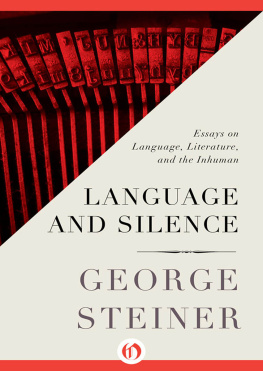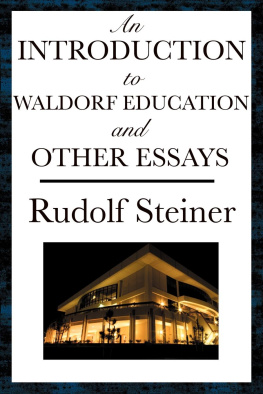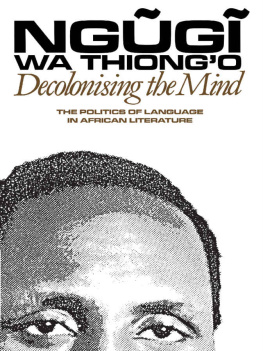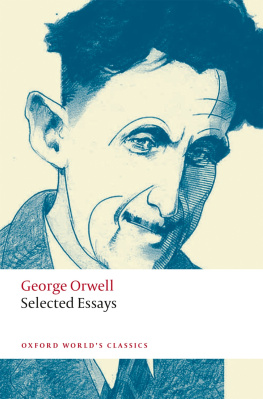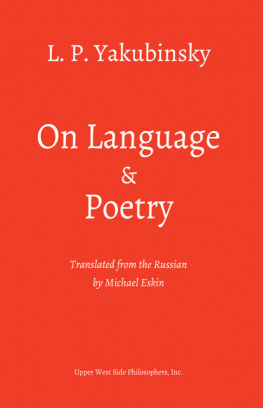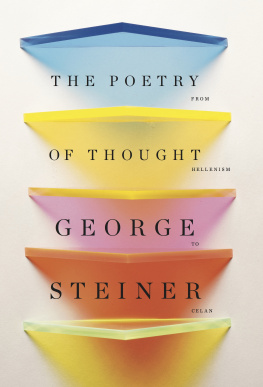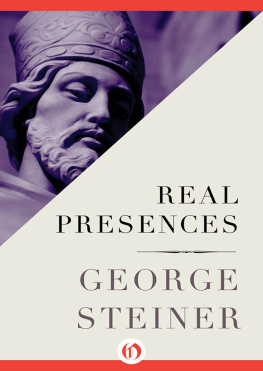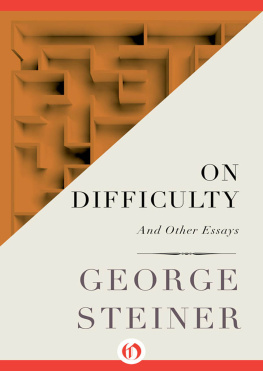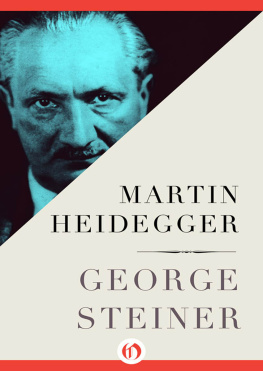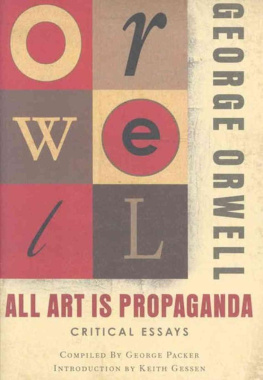Steiner George. - Language and silence; essays on language, literature, and the inhuman
Here you can read online Steiner George. - Language and silence; essays on language, literature, and the inhuman full text of the book (entire story) in english for free. Download pdf and epub, get meaning, cover and reviews about this ebook. City: New York, year: 1967, publisher: Open Road Integrated Media;Atheneum, genre: Religion. Description of the work, (preface) as well as reviews are available. Best literature library LitArk.com created for fans of good reading and offers a wide selection of genres:
Romance novel
Science fiction
Adventure
Detective
Science
History
Home and family
Prose
Art
Politics
Computer
Non-fiction
Religion
Business
Children
Humor
Choose a favorite category and find really read worthwhile books. Enjoy immersion in the world of imagination, feel the emotions of the characters or learn something new for yourself, make an fascinating discovery.
- Book:Language and silence; essays on language, literature, and the inhuman
- Author:
- Publisher:Open Road Integrated Media;Atheneum
- Genre:
- Year:1967
- City:New York
- Rating:3 / 5
- Favourites:Add to favourites
- Your mark:
- 60
- 1
- 2
- 3
- 4
- 5
Language and silence; essays on language, literature, and the inhuman: summary, description and annotation
We offer to read an annotation, description, summary or preface (depends on what the author of the book "Language and silence; essays on language, literature, and the inhuman" wrote himself). If you haven't found the necessary information about the book — write in the comments, we will try to find it.
Steiner George.: author's other books
Who wrote Language and silence; essays on language, literature, and the inhuman? Find out the surname, the name of the author of the book and a list of all author's works by series.
Language and silence; essays on language, literature, and the inhuman — read online for free the complete book (whole text) full work
Below is the text of the book, divided by pages. System saving the place of the last page read, allows you to conveniently read the book "Language and silence; essays on language, literature, and the inhuman" online for free, without having to search again every time where you left off. Put a bookmark, and you can go to the page where you finished reading at any time.
Font size:
Interval:
Bookmark:

Language and Silence
Essays on Language, Literature, and the Inhuman
George Steiner

For Churchill College, Cambridge, where much of the work was done
PREFACE

P rimarily, this is a book about language: about language and politics, language and the future of literature, about the pressures on language of totalitarian lies and cultural decay, about language and other codes of meaning (music, translation, mathematics ), about language and silence.
The essays and articles in this collection were written at different times. In most cases they are a response to a specific occasion: the publication of a book, the production of a play or opera, a political event. But their underlying theme is the life of language and of some of the complex energies of the word in our society and culture. What are the relations of language to the murderous falsehoods it has been made to articulate and hallow in certain totalitarian regimes? Or to the great load of vulgarity, imprecision, and greed it is charged with in a mass-consumer democracy? How will language, in the traditional sense of a general idiom of effective relations, react to the increasingly urgent, comprehensive claims of more exact speech such as mathematics and symbolic notation? Are we passing out of an historical era of verbal primacyout of the classic period of literate expressioninto a phase of decayed language, of post-linguistic forms, and perhaps of partial silence? These are the questions I try to raise, to get into focus.
Behind them lies the belief that literary criticism, particularly in its present cohabitation with the academic, is no longer a very interesting or responsible exercise. Too much of it exhibits the complacencies of academic or journalistic values and habits of statement developed in the nineteenth century. Books about books and that flourishing though more recent genre, books about literary criticism (a threefold remove), will no doubt continue to pour out in great numbers. But it is becoming clear that most of them are a kind of initiate sport, that they have very little to say to those who would ask what coexistence and interaction are possible beween humanism, between the idea of literate communication, and the present shapes of history. The gap between the academic, belle-lettristic treatment of literature and the possible meanings or subversions of literature in our actual lives has rarely been wider since Kierkegaard first pointed to its ironic breadth.
The most vital of modern criticism, that of Georg Lukacs, of Walter Benjamin, of Edmund Wilson, of F. R. Leavis, knows this to be the case. In his own style of vision each of these critics has made of literary judgment a critique of society, a utopian or empirical comparison of fact and possibility in human action. But even their achievements, and much in the following pages is obviously indebted to them, are beginning to seem dated. They arose from a contract of literacy which is now in doubt.
The novelty or special nature of our present position of consciousness is the second main theme of this book. I realize that historians are right when they say that barbarism and political savagery are endemic in human affairs, that no age has been innocent of disaster. I know that the colonial massacres of the nineteenth and twentieth centuries, and the cynical destruction of natural and animal resources which accompany them (the extermination of fauna being perhaps the logical and symbolic epilogue to that of native populations) are realities of profound evil. But I think there is hypocrisy in the imagination that would claim universal immediacy, that would seek impartial appropriation throughout the provocations of all history and all places. My own consciousness is possessed by the eruption of barbarism in modern Europe; by the mass murder of the Jews and by the destruction under Nazism and Stalinism of what I try to define in some of these essays as the particular genius of Central European humanism. I do not claim for this hideousness any singular privilege; but this is the crisis of rational, humane expectation which has shaped my own life and with which I am most directly concerned.
The blackness of it did not spring up in the Gobi Desert or the rain forests of the Amazon. It rose from within, and from the core of European civilization. The cry of the murdered sounded in earshot of the universities; the sadism went on a street away from the theaters and museums. In the later eighteenth century Voltaire had looked confidently to the end of torture; ideological massacre was to be a banished shadow. In our own day the high places of literacy, of philosophy, of artistic expression, became the setting for Belsen.
I cannot accept the facile comfort that this catastrophe was a purely German phenomenon or some calamitous mishap rooted in the persona of one or another totalitarian ruler. Ten years after the Gestapo quit Paris, the countrymen of Voltaire were torturing Algerians and each other in some of the same police cellars. The house of classic humanism, the dream of reason which animated Western society, have largely broken down. Ideas of cultural development, of inherent rationality held since ancient Greece and still intensely valid in the utopian historicism of Marx and stoic authoritarianism of Freud (both of them late outriders of Greco-Roman civilization) can no longer be asserted with much confidence. The reach of technological man, as a being susceptible to the controls of political hatred and sadistic suggestion, has lengthened formidably toward destruction.
To think of literature, of education, of language, as if nothing very important had happened to challenge our very concept of these activities seems to me unrealistic. To read Aeschylus or Shakespearelet alone to teach themas if the texts, as if the authority of the texts in our own lives, were immune from recent history, is subtle but corrosive illiteracy. This does not mean any indiscriminate or journalistic test of present relevance; it means that one tries to take seriously the complex miracle of the survivance of great art, of what answer we can give to it from our own being.
We come after. We know now that a man can read Goethe or Rilke in the evening, that he can play Bach and Schubert, and go to his days work at Auschwitz in the morning. To say that he has read them without understanding or that his ear is gross, is cant. In what way does this knowledge bear on literature and society, on the hope, grown almost axiomatic from the time of Plato to that of Matthew Arnold, that culture is a humanizing force, that the energies of spirit are transferable to those of conduct? Moreover, it is not only the case that the established media of civilizationthe universities, the arts, the book worldfailed to offer adequate resistance to political bestiality; they often rose to welcome it and to give it ceremony and apologia. Why? What are the links, as yet scarcely understood, between the mental, psychological habits of high literacy and the temptations of the inhuman? Does some great boredom and surfeit of abstraction grow up inside literate civilization preparing it for the release of barbarism? Many of these notes and essays try to find ways of asking the question more fully and precisely.
In method and scope I am aiming at something different from literary criticism. Knowing well where these essays fall short, I nevertheless want them to suggest the goal of a philosophy of language. To arrive at such a philosophy should be the next step if we wish to come nearer an understanding of the particular inheritance and partial desolation of our culture, of that which has undermined and that which may restore the resources of insight in modern society. A philosophy of language, as Leibniz and Herder understood the term, will turn to the study of literature with especial intensity; but it will think of literature as inevitably implicated in the larger structures of semantic, formal, symbolic communication. It will think of philosophy, as Wittgenstein has taught it to do, as language in a condition of supreme scruple, the word refusing to take itself for granted. It will look to anthropology for sustaining or correcting evidence of other literacies and structures of significance (how else are we to step back from the illusory obviousness of our own particular focus?). A philosophy of language will respond with wary fascination to the suppositions of modern linguistics. It is in linguistics that much of the intelligence once active in literary criticism and history is now concentrated. That literature and linguistics are close-bound has long been known to the poets. As Roman Jakobson says: The poetic resources concealed in the morphological and syntactic structure of language, briefly the poetry of grammar, and its literary product, the grammar of poetry, have been seldom known to critics and mostly disregarded by linguists but skillfully mastered by creative writers. A philosophy of language would seek to get the relations right.
Font size:
Interval:
Bookmark:
Similar books «Language and silence; essays on language, literature, and the inhuman»
Look at similar books to Language and silence; essays on language, literature, and the inhuman. We have selected literature similar in name and meaning in the hope of providing readers with more options to find new, interesting, not yet read works.
Discussion, reviews of the book Language and silence; essays on language, literature, and the inhuman and just readers' own opinions. Leave your comments, write what you think about the work, its meaning or the main characters. Specify what exactly you liked and what you didn't like, and why you think so.

